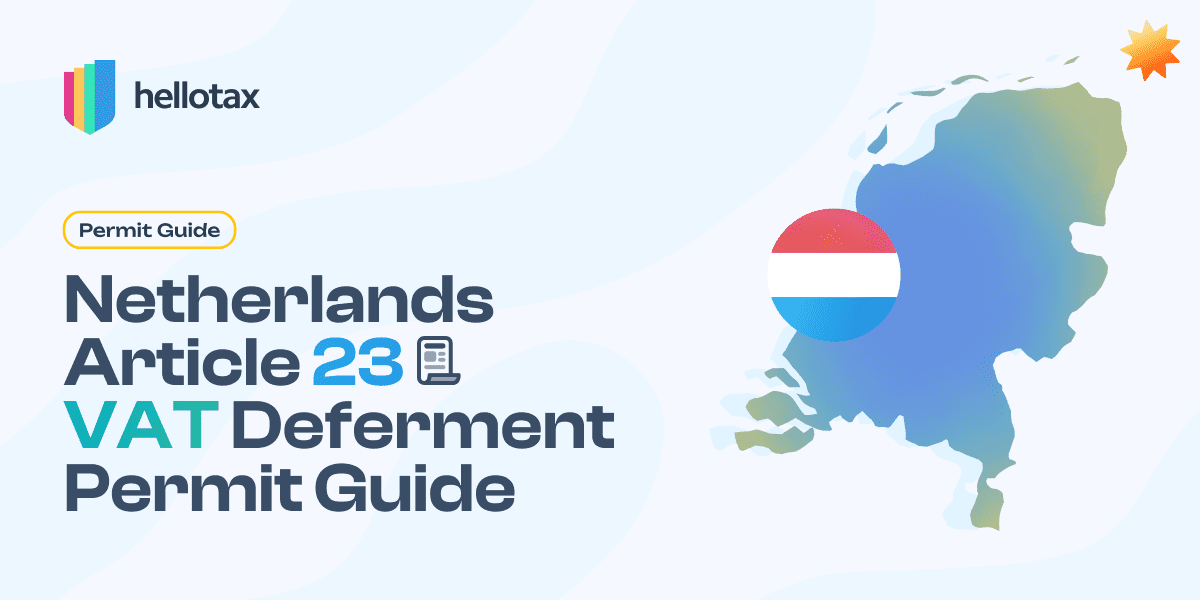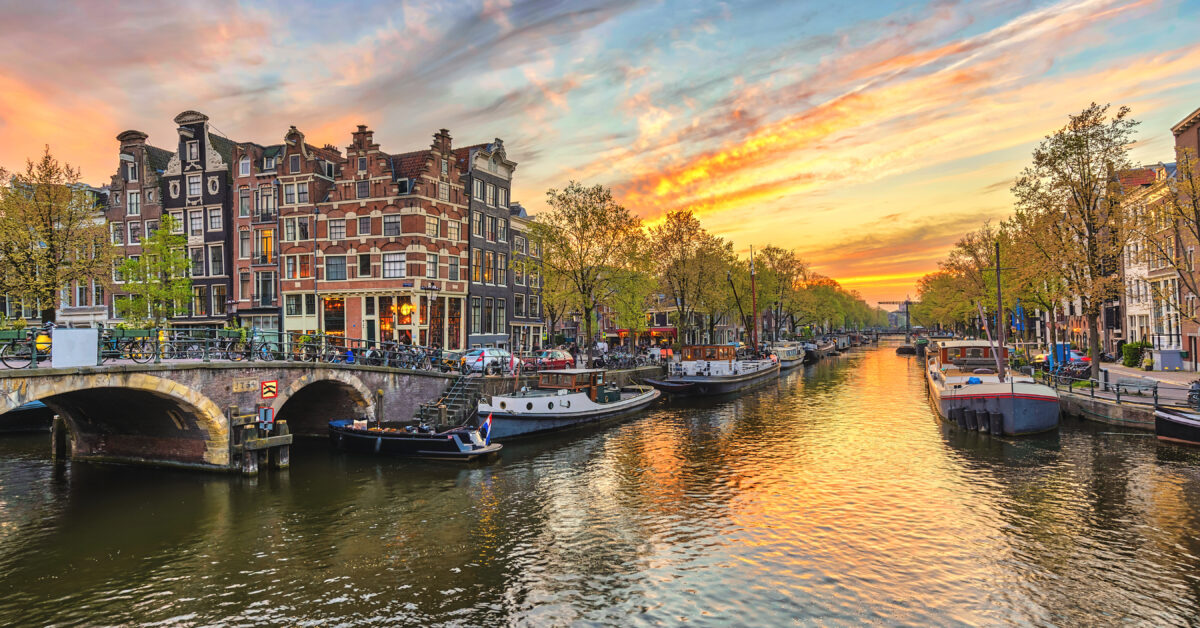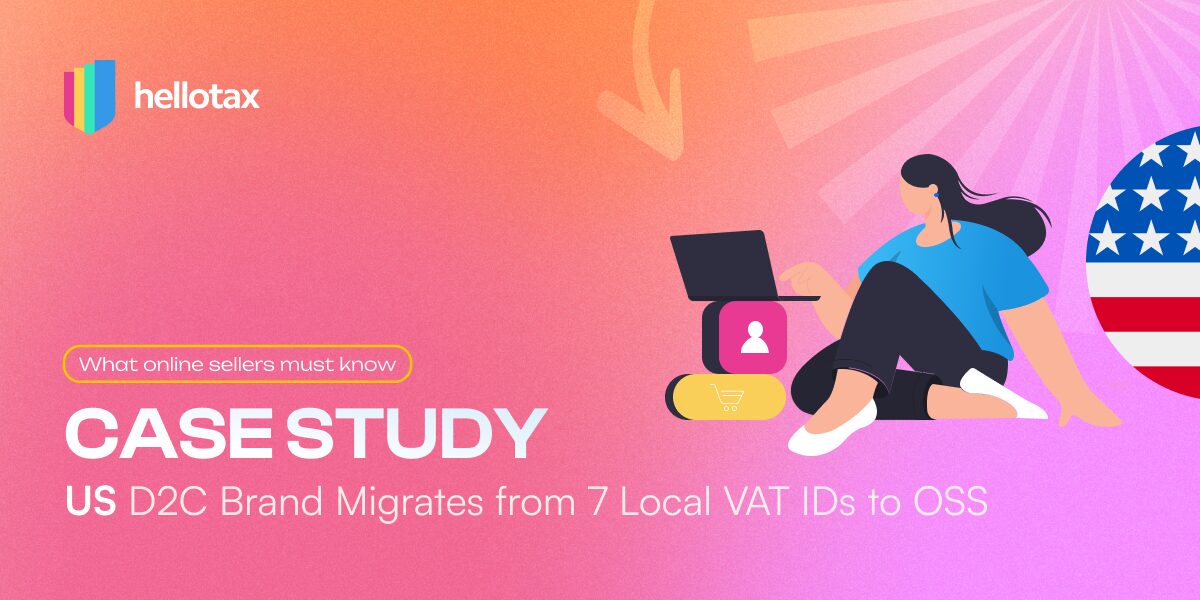Learn how the Netherlands Article 23 VAT deferment permit helps online sellers save cash flow, simplify imports, and stay VAT compliant.
Brenda Varela
Last Updated on 4 November 2025Introduction: Why the Netherlands Article 23 VAT Matters for Online Sellers
The Netherlands is one of Europe’s most important logistics hubs, with Rotterdam and Schiphol serving as gateways for e-commerce imports. For online sellers using Amazon or other platforms, understanding the Netherlands Article 23 VAT is essential.
The Netherlands VAT deferment permit allows businesses to defer import VAT instead of paying it immediately at customs. This simple mechanism can transform cash flow and streamline compliance for sellers importing goods into the EU.
📌 Related: Registering for VAT in the Netherlands
1. What Is the Article 23 VAT Deferment Permit?
The Article 23 VAT deferment permit is based on Article 23 of the Dutch VAT Act (Wet op de Omzetbelasting 1968).
-
Normally, importers must pay VAT at the border when goods enter the Netherlands.
-
With Article 23, this payment is deferred. Instead of paying at customs, the VAT is reported in the company’s next Dutch VAT return.
👉 This means no upfront VAT payments, while ensuring compliance with Dutch and EU tax law.
📌 External reference: Dutch Tax and Customs Administration – Belastingdienst (official)
2. Who Needs It and When Does It Apply?
Article 23 is especially relevant for:
-
Amazon FBA sellers storing goods in Dutch fulfillment centers.
-
Non-EU sellers importing via Dutch ports or airports before distributing goods across the EU.
-
EU-based businesses that import into the Netherlands for resale elsewhere in Europe.
You do not need the permit if you never import goods into the Netherlands or if you only sell domestically in other EU countries.
📌 Related: Amazon FBA VAT compliance in the Netherlands
3. Benefits of Article 23 VAT Deferment
-
Cash flow advantage: No upfront VAT payment at customs.
-
Simplified customs clearance: Goods move faster across the border.
-
Improved competitiveness: Frees up capital to reinvest in stock or advertising.
-
Administrative efficiency: VAT is declared in the return, alongside other transactions.
👉 For online sellers, this can mean thousands of euros in liquidity saved each month.
📌 External reference: European Commission – Import VAT rules

Book a free consultation
Our VAT experts are happy to help you. Book a free consultation today!
4. How to Apply for the Article 23 Permit
The Article 23 VAT deferment permit must be requested from the Dutch tax authority (Belastingdienst).
Requirements include:
-
A valid Dutch VAT registration.
-
Proven compliance with VAT obligations.
-
In some cases, a fiscal representative (mandatory for non-EU businesses).
Steps to apply:
-
Register for Dutch VAT.
-
Submit an Article 23 application form to the Belastingdienst.
-
Provide supporting documents (VAT number, proof of business activities, fiscal rep if required).
-
Await approval — typically processed within several weeks.
📌 Related: Fiscal representation for non-EU sellers in the Netherlands
5. Common Challenges and Mistakes
-
❌ Confusing deferment with exemption: VAT is still due — just deferred.
-
❌ Assuming it applies automatically: You must apply for the permit.
-
❌ Poor record keeping: VAT must be accurately reported in the return.
-
❌ Non-EU sellers skipping fiscal representation: This can cause delays or rejection.
📌 Related: Common VAT mistakes online sellers should avoid
6. How hellotax Can Help
hellotax helps online sellers stay compliant with VAT rules across Europe. While we don’t handle Netherlands Article 23 VAT permits directly, our platform automates VAT registrations, filings, and OSS compliance in other EU countries. For businesses using the Netherlands as an entry point, our team ensures your VAT setup aligns with EU-wide requirements.”
With hellotax, you can focus on scaling your Amazon or e-commerce business, while we handle VAT and customs complexity.
👉 Discover hellotax VAT automation tools
Conclusion & Key Takeaway
The Netherlands Article 23 VAT deferment permit allows importers to defer VAT at customs and declare it later in their VAT return. For Amazon FBA sellers and international e-commerce businesses, this is a powerful tool to free up cash flow and streamline operations.
Many online sellers underestimate how valuable the Netherlands Article 23 VAT mechanism can be when planning long-term EU expansion. Because the Netherlands is often used as the first entry point for imported goods, securing the Netherlands Article 23 VAT permit early can help businesses build a more cost-efficient supply chain from day one. By deferring import VAT and improving liquidity, sellers can reinvest this capital into product sourcing, advertising, and stock replenishment while staying fully compliant with Dutch VAT rules. For e-commerce brands scaling quickly, this strategic advantage can significantly boost cash flow and support sustainable growth in the EU market.
Key takeaway: Article 23 makes the Netherlands one of the most attractive entry points into the EU for online sellers — but applying correctly and staying compliant is crucial. Although Article 23 permits must be applied for directly with the Dutch tax authorities (and may require a fiscal representative for non-EU sellers), hellotax can help you stay VAT compliant in other EU countries and streamline your overall cross-border compliance.
📌 Related: Learn how the EU OSS scheme works for online sellers







Great breakdown of Article 23 — the cash flow benefit of deferring import VAT is something a lot of smaller sellers underestimate. I’ve seen businesses run into trouble because they didn’t realize the permit also requires consistent VAT filings to stay compliant, so it’s not just about the savings at customs but also about having processes in place afterward. Curious if you’ve seen many sellers combine Article 23 with OSS to simplify their wider EU compliance?
That’s a great point — many sellers focus on the short-term cash flow benefits of Article 23 but overlook the ongoing compliance side. Pairing it with OSS can definitely simplify reporting across the EU, especially when handled through a single representative. We covered this in more detail in our post on Fiscal Representation in the Netherlands https://hellotax.com/blog/fiscal-representation-in-the-netherlands/
Hi
How much does a company need to consider as a down payment for starting the deferment account for DUTCH VAT purposes?
Thx.
Hi Leandro! Thanks for your question.
In the Netherlands, when applying for the Article 23 VAT deferment permit, there is no fixed “down payment” or security deposit required for EU-based companies.
However, for non-EU companies, the Dutch tax authorities often require the appointment of a fiscal representative, and the fiscal representative may ask for a financial guarantee. This is not paid to the tax office, but to the fiscal representative as security. The amount is not standard and usually depends on:
your expected monthly import volume
the VAT amounts that will be deferred
your business risk profile
As a reference, the guarantee can range from €2,000 to €10,000+, but it varies by provider. Some representatives charge a fixed fee instead.